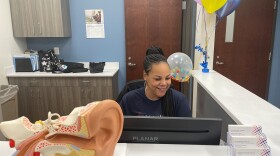The MetroHealth System and Cuyahoga Community College leaders announced a new initiative March 20 to educate all 8,700 of MetroHealth's caregivers about the various obstacles to good health and other challenges faced by marginalized communities, including LGBTQ+, Hispanic and Black populations.
Leaders from the two institutions said providing this education through these new Health Equity Centers of Excellence is meant to improve treatment of these groups and address long-standing disparities in care and public health.
Charles Modlin, MetroHealth's chief health equity officer, said the program differs from other efforts to address health care inequity beyond engaging primary care doctors. The program aims to engage all medical staff, with a particular focus on hospital staff that work within medical specialties, such as oncology and cardiology. He said a more focused approach is necessary because specialists in these and other fields deal with the diseases that disproportionately harm marginalized groups, resulting in higher mortality rates and lower life expectancies.
"We know that medicine is subdivided along different disciplines and individuals and clinicians, physicians who practice in different disciplines," Modlin said. "They have specialized training board certification, and so we want to leverage that specialized training and certification and expertise so that they can hone in, in addressing the disparities in conditions that they most commonly treat."
Modlin provided an example of this to attendees at an event rolling out the program March 20.
"Studies show that African-Americans are disproportionately affected and die from chronic diseases such as diabetes, hypertension, permanent kidney disease, stroke, colorectal cancer and a variety of other cancers — lung cancer, prostate cancer and breast cancer — and suffer disproportionately also for mental health conditions that are often undiagnosed and untreated," he said.
The same goes for other marginalized groups, such as Hispanics, who are twice as likely to be diagnosed with stomach cancer compared to non-Hispanic whites, Modlin said. Hispanics are also twice as likely to die from stomach cancer, he added.
Airica Steed, MetroHealth's president & CEO, said this approach is unique among hospital programs in the country and hopes these Health Equity Centers of Excellence serve as a model for other institutions nationwide.
"In all of my years of working in this particular space, no other health system across the country and no other community-centered system across the country is approaching this in the same manner in which we're doing it," Steed said.
Steed noted caregivers are being educated on historic inequity and how different groups have been treated by the medical community, along with all of the social drivers of poor health, such as food and economic insecurity, and lack of access to transportation and housing.
This will make MetroHealth caregivers more attuned to each person's health care needs, she said.
"What we're training on is how to not ignore the needs of our community, how to understand the basic needs of our community," Steed said.
MetroHealth is partnering with Tri-C on the effort through use of the college's staff and students who come from marginalized communities. Tri-C President Michael A. Baston said doing so helps better inform hospital staff about the realities facing different communities.
"The wonderful thing is that many of our students are residents of the neighborhoods that they live from, that we actually get them to bring in people from the community into these meetings, so we have this sort of multi-generational strategy," Baston said.
He added that this interaction is a two-way street, with the community also being informed about the health care resources available to them.
"It is very important for us to make sure that the community has access to the medical team, and we use Tri-C as that bridge for the community to come in and not necessarily have to go to a hospital to have access to great people in the medical field," he said.
Modlin agreed.
"We want to empower individuals with an understanding of, and a knowledge of, what they need to do to improve their health, what type of health screenings they should undergo for themselves and their families," he said. "That's an example of how we're developing partnerships, relationships. We're building more trust between the communities as well by developing these named health equity centers."
One way this is happening is through the 2024 MetroHealth Men’s Health Fair from 11 a.m. to 4 p.m. April 27, which will be hosted at Tri-C's Alex B. Johnson Center at the Metropolitan Campus in Downtown Cleveland. MetroHealth will simultaneously host the fair at its Cleveland Heights Medical Center. The fair, which is free and open to the public, will offer health screenings, health education and career resources. Individuals can pre-register for the event.
Steed told attendees at the event that holding the program at Tri-C fills an important gap by, "increasing health care access to an extraordinarily important and often overlooked population, our students, our learners."







